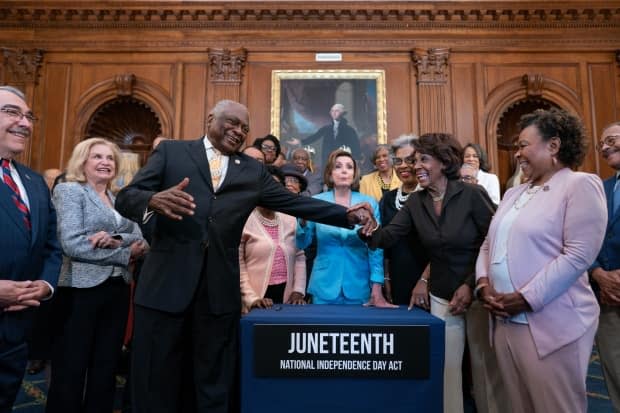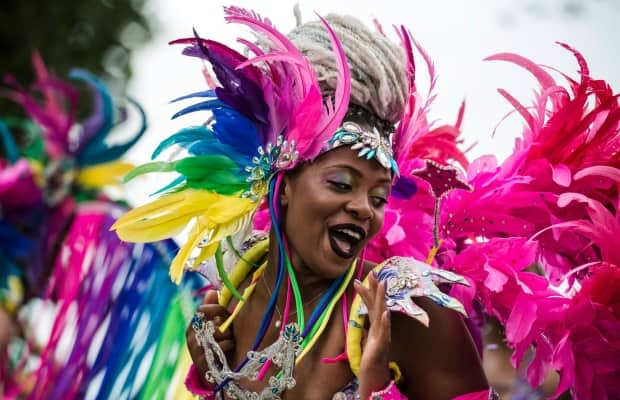Canada does not have a Juneteenth celebration — and we don't need one

This piece is an opinion from Lincoln Anthony Blades, president and principal cultural impact consultant for All Things Being Equal, a startup focused on assisting companies with creating multicultural communications and communication strategies. For more information about CBC's Opinion section, please see the FAQ.
After the murder of George Floyd was captured and shared around the world last summer, many white communities found themselves thrust into what can best be defined as the Great White Awakening.
Prior to the killing of Floyd, Breonna Taylor, Ahmaud Arbery and many other Black victims also lost their lives to state-sponsored violence in 2020. But the eight-minute-and-46-second video of Floyd's demise became the catalyst for a deluge of corporate and political anti-racism declarations.
The actual follow-through on those declarations has been largely inconsistent, but organizations and governments alike are still trying to find ways to appeal to the Black community. In North America, one publicized aspect of the outreach has been the institution of federal holidays to commemorate important dates in national (Black) history.
On June 17, U.S. President Joe Biden signed the Juneteenth National Independence Day Act into law, turning June 19 into a federal holiday. The date is significant to African Americans, as June 19, 1865, marks the day the last enslaved Black folks, located in Galveston, Texas, were made aware that they were free as per President Lincoln's Emancipation Proclamation from 1863.
In Canada a few months earlier, MPs in the House of Commons voted to recognize Aug. 1 as Emancipation Day across the nation, in acknowledgement of Aug. 1, 1834, the day the British Empire officially abolished slavery.
While these two federal declarations may seem very similar, the reality is that they are actually quite different. Juneteenth is not Emancipation Day, and Emancipation Day is not Juneteenth.
Not only does the Black Canadian community not have a Juneteenth celebration, Black Canadians don't need one.
A Black-led celebration
Although Juneteenth is a 155-year-old event dating back to the original celebration by newly freed Black men and women on June 19, 1866, a new Gallup survey found that 68 per cent of white American adults either knew "a little bit" or "nothing at all" about Juneteenth.
The reason is that Juneteenth has always been a Black-led, Black-organized and Black-celebrated tradition originating throughout the South during Reconstruction.
"Juneteenth is our 4th of July," Shanita Hubbard, a U.S. author and journalism instructor at the University of Toronto, told CBC. "We really didn't need the federal government to recognize it in order for it to be legitimate. We legitimized it on our own."
While slavery was ostensibly banned, it was actually enshrined in the U.S. constitution through a clause in the 13th Amendment, which states that slavery can still exist as a punishment for crime, which opened the door to mass incarceration. And yet, the celebration of Juneteenth continued.

While white citizens and political organizations banded together to undo all the political and social progress gained by Black folks by instituting the racial caste system known as Jim Crow, Black folks continued the tradition.
While the violence from white domestic terror groups such as the White Citizens Council and the Ku Klux Klan got so bad that it led to the Great Migration of African Americans moving throughout the United States, Black folks continued the tradition in their new locales.
As historian Isabel Wilkerson writes in The Warmth of Other Suns, "The people from Texas took Juneteenth Day to Los Angeles, Oakland, Seattle, and other places they went."
While Black folks, like the rest of the country, may have had to clock in at work on June 19 for the past 154 celebrations, the significance of the date has been embedded in the African American community thanks to their perseverance.
A different experience in Canada
The history of the Black community in Canada is, for many reasons, unique from the Black legacy in the United States. While less than 10 per cent of the Black American collective is foreign-born, Statistics Canada reports that less than 10 per cent of Black Canadians were born to parents also born in Canada (compared to 58.4 per cent of Canada's total population).
As of 2016, around half of Canada's Black population identified as immigrants, with the single largest period of Black immigration being 2001 to 2010. These Black immigrants come mostly from countries such as Jamaica, Haiti, Nigeria and Ethiopia — nations with their own unique cultures, faiths and traditions. This does not in any way make the Black Canadian experience less than the African American experience, but it does make it different.
While Canada has a wealth of Black historic communities in Nova Scotia, Owen Sound, Ont., and Salt Spring Island, we also have a young and developing Black community made up of first- and second-generation Canadians and their immigrant elders, who are establishing what Black Canadian identity means to them.
"When I think of Emancipation Day, my mind automatically goes to a Caribbean context, as my parents' homeland of Jamaica is one of the islands that also marks the day on August 1st," said Bee Quammie, a London, Ont.-born writer, speaker and educator. She continued to tell CBC, "I didn't learn that there was a Canadian Emancipation Day until adulthood."

Today, Black Canadians either have their centuries-old experience in this nation blindly equated with the experience of American descendants of slavery, or have their current cultural norms compared to those of African Americans. For so many Black Canadians in the latter group, it can be difficult to be fastened to your origins while simultaneously attempting to distinguish what our Black identity is here.
Recognizing our unique and evolving identity is, at this moment, far more important than applying non-nuanced comparisons to our neighbours to the south.
Unique identity
If the federal government truly wants to assist Black Canadian communities, then a priority must be made of supporting our emerging, organic cultural celebrations. For example, for many Black Ontarians, that has looked like Caribana, a Caribbean-style street festival created in Toronto in 1967 that has become a massive Black cultural tradition throughout the province.
In truth, eliminating the proliferation of police officers and cage-like fences at the parade would, for many Black Ontarians, be a far more significant act than making Aug. 1 Emancipation Day.
It is crucial to understand the similarities of the prejudice that exists throughout the global Black diaspora. Yet it is just as important to understand the nuances that define our specific national and ethnic experiences.
What Canadian citizens, organizations and political bodies must avoid is attempting to conflate the African American experience with the Black Canadian experience.
Emancipation Day is not Canada's Juneteenth celebration, just as Viola Desmond is not Canada's Rosa Parks. Canada's Black community does not need tired equivalences to African Americans. What we need is space and support to grow our own legacy in this country.
For more stories about the experiences of Black Canadians — from anti-Black racism, to success stories within the Black community — check out Being Black in Canada, a CBC project Black Canadians can be proud of. You can read more stories here.


 Yahoo Movies
Yahoo Movies 